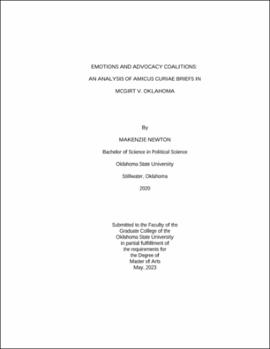| dc.contributor.advisor | Olofsson, Kristin | |
| dc.contributor.author | Newton, Makenzie | |
| dc.date.accessioned | 2023-08-25T20:06:22Z | |
| dc.date.available | 2023-08-25T20:06:22Z | |
| dc.date.issued | 2023-05 | |
| dc.identifier.uri | https://hdl.handle.net/11244/338949 | |
| dc.description.abstract | The Advocacy Coalition Framework (ACF) integrated with emotional expression analysis gives researchers the opportunity to study policy signaling and coalitions’ policy beliefs in a novel way. Using the 13 amicus curiae briefs filed in the Supreme Court case McGirt v. Oklahoma, I explore how emotions are used by advocacy coalitions as they relate to policy beliefs. I hand coded 725 observations in Discourse Network Analysis (DNA), to identify the actor, tribal jurisdiction policy position, emotional expressions, and beliefs for each observation. Within the tribal jurisdiction policy subsystem, I found two predominant coalitions–the support tribal jurisdiction and oppose tribal jurisdiction coalition. I suggest the alignment of coalitions is explained by the belief homophily hypothesis–the idea that coalitions form around shared threats or opponents. The belief homophily hypothesis is characterized by trust and fear. I found that the frequency of emotional expressions was highest for the oppose-tribal jurisdiction coalition and this coalition was more likely to use fear-based emotions. The support-coalition used more enthusiasm-based emotions. This paper contributes to the literature in three ways. First, it uniquely uses amicus briefs as a data source to explore emotions. Second, this works contributes to interpretive framework combining components of the ACF and emotion expression analysis. Lastly, it expands venues of policy signaling from more conventional spaces like the legislative branch to the judicial process within the ACF. | |
| dc.format | application/pdf | |
| dc.language | en_US | |
| dc.rights | Copyright is held by the author who has granted the Oklahoma State University Library the non-exclusive right to share this material in its institutional repository. Contact Digital Library Services at lib-dls@okstate.edu or 405-744-9161 for the permission policy on the use, reproduction or distribution of this material. | |
| dc.title | Emotions and advocacy coalitions: An analysis of amicus curiae briefs in Mcgirt v. Oklahoma | |
| dc.contributor.committeeMember | Rudloff, Peter | |
| dc.contributor.committeeMember | Harvey, Cole | |
| osu.filename | Newton_okstate_0664M_18111.pdf | |
| osu.accesstype | Open Access | |
| dc.type.genre | Thesis | |
| dc.type.material | Text | |
| dc.subject.keywords | Advocacy Coalition Framework | |
| dc.subject.keywords | amicus brief | |
| dc.subject.keywords | discourse | |
| dc.subject.keywords | Mcgirt v Oklahoma | |
| dc.subject.keywords | policy process | |
| thesis.degree.discipline | Political Science | |
| thesis.degree.grantor | Oklahoma State University | |
